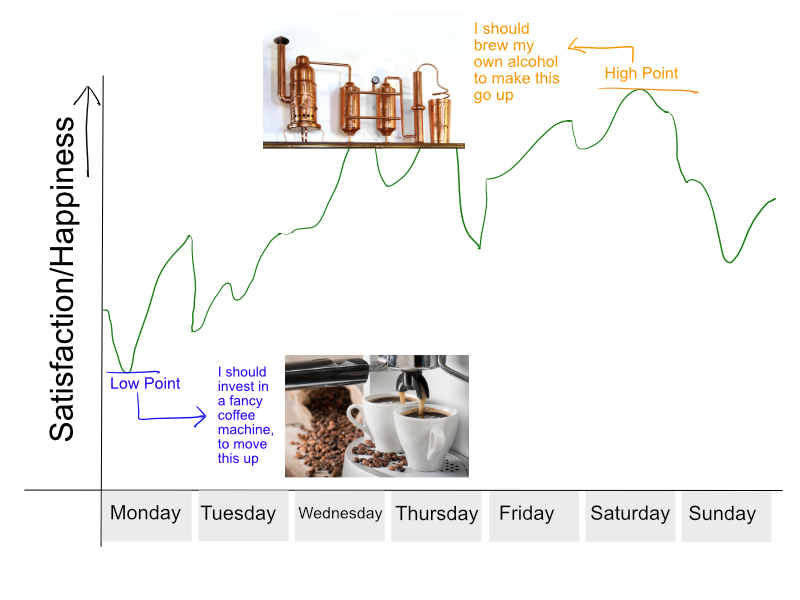Asking the Wrong Questions

One question I like to answer myself essentially poses itself is the personal investment question: if I had some extra time, money, wishes, etc. Would I put them into making the best hours of my week better? Or would I put them into making the worst hours of my week better?
For example, should I buy a new coffee maker, so that my morning coffee on my way to work is better? Should I buy new headphones so that I can listen to music in bliss while I work?
Or should I put that money into an attachment for my bike, so that when I go for a bike ride, I can capture video of it. Or should I instead buy tickets to a fun concert for me to attend on the weekend?

Knowing this goal is somewhat useful knowledge. For example, if I’m already energized at work maybe the coffee doesn’t make sense, or if I look forward to interacting with my workmates, maybe the headphones don’t make sense.
Alternatively, if I’m constantly worried about work, the concert could either be a great distraction, or it could be pointless if I’m going to obsess about the work I have to do anyway.
Thing is, this question of optimization is pretty limited. And, in fact, it might actually be in the way of my happiness.
There is another alternative: maybe neither the best hour of my nor the worst hour of my week need fixing. I posit that viewing life itself as an optimization problem is a problem itself. (Well, maybe not a problem, but certainly a short-sighted distraction.)
This constant need to improve ones’ life is itself an incessant treadmill. You’re constantly looking for the best deal on what you need next. Or you feel like you don’t have enough time to do the project you set out to do that will make life (the best or worse moments) better.
Instead of buying better headphones, enjoy the ones you have.
I’d place this seemingly logical question in a class of questions which seem like they are useful, but are really an artificial mental construction which doesn’t necessarily have any grounding in reality. But, since we thought the thought, it’s hard to admit (or understand) that the question itself can be dismissed, that it was conceived in our mind, and isn’t indeed part of the world around us. Usually, “Why did so-and-so do that?” fall into this category: trying (or pretending to try) to explain someone else’s behavior when we have our own mental model.
Finally, optimizing on a week-by-week basis is also arbitrary. Maybe the best thing you can do is to forego any change for months, so you can incrementally get to a better point in a year. (I picked a week here, because most people have 5 work days and 2 weekends, so you see the contrast between the best and worst times during the course of a week.) Things that have made me truly happy usually took longer than a week.